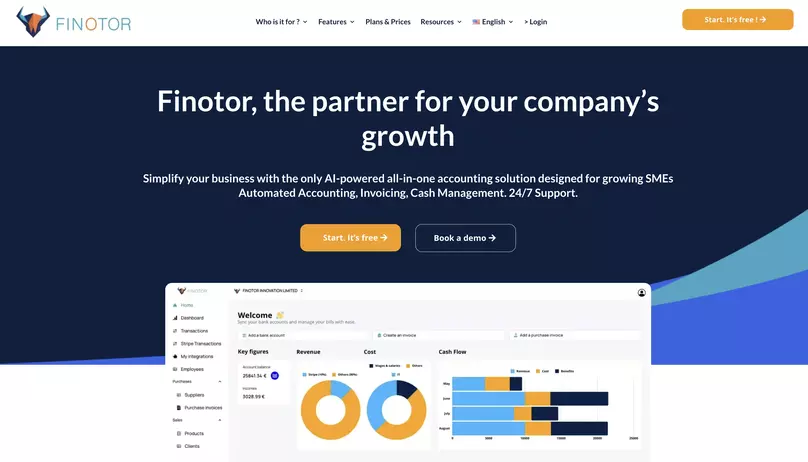The Vital Role of Accounting in Business
In today’s fast-paced and constantly evolving business landscape, achieving success requires more than just innovative ideas and strategic vision; it demands meticulous financial management. Central to this is accounting, often regarded as the language of business, which serves as a foundation for understanding, evaluating, and optimizing a company’s financial health. Far from being a routine exercise in number-crunching, accounting provides critical insights into an organization’s operations, guiding leadership in making informed decisions that can drive growth, efficiency, and sustainability. By accurately tracking revenues, expenses, assets, and liabilities, accounting enables businesses to chart their progress, allocate resources effectively, and anticipate future financial challenges.
A pivotal tool in strategic planning is the balanced scorecard, which translates vision and strategy into actionable objectives across four key perspectives: financial, customer, internal business processes, and learning and growth. The strategy map, which visually represents the relationships between these objectives, helps businesses align their activities with long-term goals, ensuring all efforts contribute to the overall strategy.
The indispensable role of accounting extends far beyond compliance and financial reporting. It helps businesses evaluate profitability, manage risks, and plan strategically for both the short and long term. Through the application of accounting principles and practices, organizations gain the ability to analyze performance metrics, streamline processes, and identify opportunities for cost savings or expansion. Moreover, with the advent of new technologies and automation tools, the future of accounting is set to evolve, becoming even more integrated into the strategic functions of businesses.
This article delves into the vital role that accounting plays in achieving business success, exploring its core principles, key practices, and emerging trends that will shape the future of the profession. Understanding the importance of sound financial management through accounting is essential for any organization aspiring to thrive in today’s competitive environment.
The Foundation of Success: Core Accounting Principles
The Importance of Accuracy and Consistency
At the heart of effective accounting, and particularly success accounting, are the principles of accuracy and consistency. Accurate financial records ensure that all transactions are correctly recorded, leading to reliable financial statements. Consistency, on the other hand, allows businesses to compare financial data over time, making it easier to identify trends, forecast future performance, and make strategic decisions that are crucial for strategy development. Examining internal business processes within strategic planning frameworks, such as the Balanced Scorecard and strategy maps, is essential for aligning day-to-day operations with long-term goals, improving operational efficiency, and achieving strategic objectives. These principles also play a critical role when assessing the potential for new investments, ensuring that financial health and growth opportunities are considered before committing resources. Maintaining accuracy and consistency is essential for preserving the integrity of financial reporting and fostering trust among stakeholders.
Transparency: Building Trust and Credibility
Transparency in accounting is crucial for building credibility with investors, regulators, and other stakeholders. Transparent financial reporting provides a clear view of a company’s operations, enabling stakeholders to assess its financial performance and make informed decisions. Incorporating a strategy map into the reporting process can further enhance transparency by visually connecting financial data with strategic objectives, helping stakeholders understand how the company’s actions align with its long-term goals. Companies that prioritize transparency are more likely to attract investment, secure loans, and maintain a positive reputation in the marketplace.
Strategic Financial Analysis: Driving Informed Decision-Making
Unlocking Insights Through Financial Statements
Financial statements, such as the balance sheet, income statement, and cash flow statement, are powerful tools for understanding a company’s financial position. These documents provide a snapshot of the company’s assets, liabilities, revenues, and expenses, allowing for a comprehensive analysis of its financial health. By regularly analyzing these statements, businesses can identify strengths, weaknesses, and opportunities for growth.
Budgeting and Forecasting: Planning for the Future
Budgeting is a critical aspect of financial planning that helps businesses allocate resources effectively. By setting financial targets and monitoring performance against these goals, companies can ensure they are on track to achieve their strategic objectives. Forecasting, which involves predicting future financial outcomes based on historical data and market trends, further aids in decision-making by providing a roadmap for growth and risk management aligned with the company’s strategic plan.
Building an emergency fund is also essential for financial health. An emergency fund should consist of readily accessible savings, ideally covering three to six months’ worth of living expenses. This fund provides financial security during unexpected situations, such as job loss or urgent repairs, ensuring that businesses can navigate unforeseen challenges without compromising their financial stability.
Variance Analysis: Adjusting Course as Needed
Variance analysis is the process of comparing actual financial performance with budgeted figures. This analysis helps businesses identify deviations from their plans, understand the reasons behind these discrepancies, and take corrective actions. Clear communication of these findings is essential, as it ensures that all stakeholders are aligned on the necessary adjustments and that corrective measures are implemented effectively. By continuously monitoring variances, companies can stay agile and responsive to changes in their operating environment, increasing their chances of long-term success.
Leveraging Technology in Accounting: The Future of Financial Management
The Rise of Automation and AI in Accounting
The integration of technology into accounting practices has revolutionized the field, making processes more efficient and less prone to error. Automation tools and accounting software have streamlined tasks such as bookkeeping, payroll, and tax preparation, freeing up accountants to focus on more strategic activities. Moreover, artificial intelligence (AI) is increasingly being used to analyze large datasets, uncovering insights that can drive business innovation and growth.
Data Analytics: Transforming Financial Insights
Advanced data analytics is enabling accountants to dive deeper into financial data, uncovering patterns and correlations that were previously difficult to detect. This capability allows businesses to make more informed, data-driven decisions, optimizing their operations and enhancing profitability. As data analytics tools continue to evolve, their impact on accounting and business strategy will only grow.
The Human Element: The Importance of Skilled Accountants
The Need for Expertise in Accounting
While technology has transformed many aspects of accounting, the need for skilled professionals remains paramount. Accountants must not only understand accounting principles but also possess a deep knowledge of the industry in which they operate. This expertise allows them to interpret financial data, metrics, strategy mapping, and the strategic planning process in context, providing actionable insights that align with the company’s strategic goals. A mission statement plays a crucial role in defining the organization’s core purpose and guiding accountants in their strategic planning and decision-making processes. Continuous professional development is essential for accountants to stay current with changes in standards, regulations, and best practices.
Ethics in Accounting: Upholding Standards and Integrity
Ethics play a crucial role in accounting, as financial professionals are often faced with decisions that can impact the accuracy and integrity of financial reporting. Upholding high ethical standards is essential for maintaining the trust of stakeholders and ensuring the long-term success of the business. Companies that prioritize ethical accounting practices are better positioned to avoid scandals, legal issues, and reputational damage.
Conclusion: Accounting as a Strategic Asset in Strategic Planning
In today’s highly competitive and rapidly changing business environment, accounting has transcended its traditional role as a mere back-office function to become a critical strategic asset. The importance of accounting in driving business success cannot be overstated. It serves as the backbone of any organization, providing the financial clarity and insights necessary to navigate complex business challenges, make informed decisions, and capitalize on opportunities for growth.
Accounting is essential for ensuring accurate financial reporting, which is fundamental to maintaining the trust of stakeholders—whether they are investors, regulators, or customers. Transparent and reliable financial statements allow business leaders to assess their company’s financial health, identify trends, and make strategic decisions that align with their long-term goals. Furthermore, accounting plays a pivotal role in strategic planning. It enables businesses to allocate resources efficiently, manage risks, and measure performance against set objectives, ensuring that the organization remains on a path to sustained success. A well-executed strategic plan ensures that accounting practices support the long-term vision, aligning resources and operations with broader business objectives. Strategy execution is crucial in this context, as it involves aligning organizational actions with the strategic plan, identifying benchmarks, allocating resources, and providing the leadership necessary to achieve established goals.
The advent of technology has further elevated the role of accounting. With the integration of automation, data analytics, and artificial intelligence, accounting has become more efficient and insightful. These technological advancements allow businesses to delve deeper into financial data, uncovering trends and patterns that can inform the strategic plan and drive innovation. As businesses continue to evolve, the ability to harness these insights will become increasingly important, making accounting not just a tool for managing finances, but a catalyst for growth and competitive advantage. Strategic management, as an ongoing process, integrates activities to ensure that an organization’s resources align with its mission and goals.
Moreover, the value of accounting extends beyond financial management. It is instrumental in building credibility and trust with external stakeholders, which is crucial for securing investments, obtaining financing, and maintaining a strong market reputation. Companies that adhere to high standards of accounting and transparency are better positioned to attract and retain investors, negotiate favorable terms with lenders, and comply with regulatory requirements, all of which contribute to long-term success.
As the business landscape continues to shift, the role of accounting will only grow in significance. The ability to adapt to new regulations, embrace emerging technologies, and anticipate financial trends will be critical for business leaders aiming to stay ahead of the curve. Therefore, investing in robust accounting practices and developing skilled professionals who can leverage these tools effectively is not just advisable—it is essential for any organization striving to achieve and sustain success in the modern business world.
In summary, accounting is far more than a support function; it is a strategic pillar that underpins the entire business ecosystem. By providing the financial insights and strategic guidance necessary for informed decision-making, accounting helps businesses not only survive but thrive in an increasingly complex and competitive environment. For any organization committed to long-term success, a strong accounting foundation is indispensable, making it a cornerstone of sustainable growth and innovation.
FAQ’S :
1. Why is accounting considered the language of business?
Accounting is often referred to as the language of business because it systematically records, analyzes, and communicates financial information. This information is critical for decision-making, performance evaluation, and strategic planning within a business. Aligning accounting practices with the organization’s vision ensures that all financial activities support long-term goals and objectives. This alignment is essential for effective decision-making, resource allocation, and fostering a strong organizational culture.
2. How do accuracy and consistency in accounting impact a business’s financial health?
Accuracy ensures that all financial transactions are recorded correctly, leading to reliable financial statements. Consistency allows businesses to compare financial data over time, making it easier to identify trends and make informed decisions, which ultimately supports business growth and stability.
3. What role does transparency play in accounting?
Transparency in accounting builds trust and credibility with investors, regulators, and other stakeholders. Transparent financial reporting allows stakeholders to accurately assess a company’s financial health, which can enhance its reputation and ability to attract investment.
4. How do financial statements help in decision-making?
Financial statements like the balance sheet, income statement, and cash flow statement provide a detailed overview of a company’s financial status. Analyzing these documents helps businesses identify strengths, weaknesses, and opportunities, enabling informed and strategic decision-making.
5. What is the significance of budgeting and forecasting in business?
Budgeting helps businesses allocate resources effectively by setting financial targets, while forecasting predicts future financial outcomes based on historical data. Both are essential for strategic planning, guiding businesses toward their organizational goals and helping them manage risks. Organizational goals provide direction and guidance, ensuring that both long-term and short-term objectives are clearly defined and actionable.
6. What is variance analysis, and why is it important?
Variance analysis involves comparing actual financial performance with budgeted figures. It is crucial because it helps businesses identify deviations from their strategic plans, understand the causes of these discrepancies, and take corrective actions to stay on track. Effective variance analysis ensures that strategic plans remain flexible and responsive to changing environments, allowing organizations to navigate challenges and meet their goals.
7. How is technology transforming accounting practices?
Technology, including automation and artificial intelligence (AI), has revolutionized accounting by streamlining processes such as bookkeeping, payroll, and tax preparation. This allows accountants to focus on more strategic tasks and enhances the accuracy and efficiency of financial management. Additionally, the use of a strategy map as a visual planning tool illustrates the connections between an organization’s strategic objectives in a clear and intuitive manner. This enhances communication about the strategy, aligns team efforts with overarching business goals, and helps stakeholders identify relationships among different strategic elements.
8.What role does data analytics play in modern accounting?
Data analytics allows accountants to analyze large datasets to uncover patterns, trends, and correlations. This deeper insight enables more informed decision-making, helping businesses optimize operations and improve profitability.
9.Why are skilled accountants still necessary for business leaders despite technological advancements?
Despite the rise of automation, skilled accountants are essential for interpreting financial data in context, understanding industry-specific challenges, and providing strategic insights. Their expertise and ethical judgment are critical in making complex financial decisions that align with a company’s goals.
10. How do ethics influence the accounting profession?
Ethics are fundamental in accounting as they ensure the accuracy and integrity of financial reporting. Accountants are often faced with decisions that can significantly impact financial statements. Upholding ethical standards is crucial for maintaining stakeholder trust and preventing legal or reputational issues.









